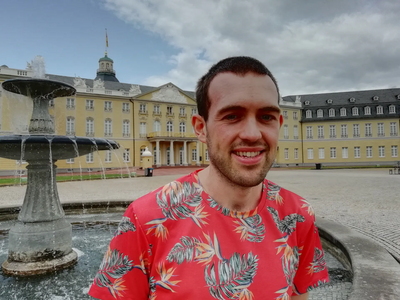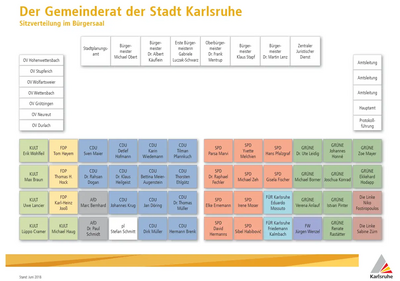My visit to Nottingham’s twin city Karlsruhe

Intro
Recently I visited Nottingham's twin city, Karlsruhe, for the day. Karlsruhe is located in the South-West of Germany and is Nottingham's longest standing twin city with both having benefited from many civic, cultural and business initiatives. The cities have collaborated on a number of projects, most notably the tram system in Nottingham, whilst Karlsruhe's system is currently undergoing some major renovations.
The two cities are very similar in terms of population (Nottingham: 321,500, Karlsruhe: 311,919), although Karlsruhe is over twice as big as Nottingham in terms of area (Nottingham: 74.61km2, Karlsruhe: 173.46km2). However, taking in to account the suburban area outside the City of Nottingham boundary, the population is 915,977 While Nottingham has been known for its Lace whereas the city now focuses on low carbon industries such as life science and digital media, Karlsruhe too has industrial history too being home to Germany's largest oil refinery and also playing a big role in the high-tech industry (where 20% of the jobs in this sector provide employment within the city).
I was inspired to write this article as I believe the city, along with the neighbouring borough of Gedling, can learn some things from the city of Karlsruhe such as their Liberal outlook and their attitude to Green politics that embraces new technology, which is something the Liberal Democrats wish to champion further. Furthermore, Karlsruhe is a vibrant cultural city with many art galleries and museums and has a young population. It also plays an important role in German law as the home of two of Germany's highest courts.
The link also underlines how vital the EU is to the Nottingham area and how collaboration with other cities in other countries can be hugely beneficial to Nottingham. Currently trade to the EU is vital to Nottingham's economy with 59% of exports from Nottingham going to EU countries. Furthermore, there are more than 2,000 registered students from EU countries who attend one of the two Universities in Nottingham (worth approximately £40m a year to the local economy).
Lib Dem influence and environmental policy
Recently the (FDP), the Liberal Democrats sister party in Germany, arranged a guided tour through the beautiful forests of Karlsruhe in order to rekindle the community spirit as well as to highlight the importance of green scenery and being greener in general. This was an initiative of the city council of Karlsruhe led by FDP councillor Thomas Hock, one of the 3 FDP members currently on Karlsruhe council. As well as this initiative highlighting the importance of looking after the environment it also helped bring the community together, which is especially important given how mental health has been hitting the news. The Liberal Democrats can take inspiration from activities such as these since working for the local community and taking the initiative on the environment are two of the Party's core values. When in government the Liberal Democrats took the initiative when it came to environmental policy.
The Liberal Democrats introduced some successful initiatives during the coalition, of which the plastic bag tax is probably best known. This tax has been highly successful in achieving its aim of reducing the public's consumption of plastic bags by charging 5p for one. Indeed, it is possible that the 5p cost might increase to 10p to further drive home the need to cut down on plastic. Another success in the coalition government was the initiative championed by Ed Davey that set up the Green Investment Bank, which used state money along with private money to invest in the latest green technologies. One example of this was kickstarting the offshore wind industry, increasing clean renewable energy and meaning that the cost to power homes has, and will further, come down in price. This took the technology into the 21st century and as one of the world leaders in it, we've moved from basic technology to "mature, cheap technology". Despite this success, the 2015 Conservative Government sold it off to Australian firm Macquarie for £2.3 billion before there had been an opportunity to realise the full potential of the Green Investment Bank (taking back control?). In the future, we'll need it for things like battery storage and tidal wave power. Interestingly the Conservatives recently vetoed the Swansea Tidal Lagoon and approved Fracking, which illustrates where their priorities lie and none of them seems to focus on green energy. The cancellation of the East Midland Mainline electrification is a further example of environmental de-prioritisation.
Transport
Regarding transport, The most well-known link between the two cities is the tram network, with Nottingham seeking guidance from their German counterparts on how to implement the network. Given that there is much talk of extending Nottingham's tram line to Gedling, with the Council having recently contributed £50,000 towards a feasibility study, I believe we can look to Karlsruhe's recent expansion of their tram network for inspiration as their tram network additionally services many small areas around the city. In Karlsruhe there seems to be an emphasis on an environmental agenda as the city is currently in the process of running some tram lines underground in order to ease congestion in addition to recycling and looking after the environment.
Furthermore, a comparison between Nottingham and Karlsruhe tram networks show that Nottingham currently operates two tram lines (32km in length) while Karlsruhe has twelve, totalling 262km in length. The Karlsruhe network has 190 stops compared to 51 for Nottingham. In terms of cost to build, the tram network in Nottingham totalled nearly £800 million for both phases combined with phase one costing £200 million in 2004, while phase two cost £578 million (£437 million through UK Govt PFI credits and £141 million via local Govt PFI credits). Whilst the annual number of passengers using the Nottingham system has increased over the past year (17/18) with roughly 17.8 million people using the tram, in Karlsruhe the figure stands at over 100 million (although this includes tram and bus journeys combined). In terms of bus use for Nottingham, the city has bucked a national trend with bus use up whilst across England there was a decrease of 4% over a 3-year period from 2013/14 to 1,238 million miles clocked up by buses. In Nottingham over the same period miles clocked up by bus rose by 8% to 11.17 million (from 10.33 million), although bus mileage fell when taking into account the whole of Nottinghamshire (excluding the city) by 8.4% to 15.79 million.
Governance
The council make up for the city council in Karlsruhe can be seen in the image below. The city council consists of the Mayor who is the voting chairman along with 48 councillors (volunteers) who are elected every 5 years by the Karlsruhe population. For the council and state elections, it uses a form of Proportional Representation (members list). Something that is evident from their electoral system compared to ours is that PR enables parties that place priority on environmental initiatives to be represented and influence the agenda as seen with Karlsruhe council, whereas in the UK this is rarely the case with either Conservative or Labour dominated councils. Their system is head and shoulders above our First Past The Post system which heavily favours the major two parties, but as Liberal Democrats we have campaigned for decades for a system befitting of similar to theirs with some type of Proportional Representation.

